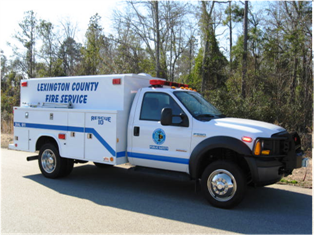Next Council Meeting
 The Official Web Site of the State of South Carolina
The Official Web Site of the State of South Carolina
Lexington County Administrative offices will be closed on Thursday (November 28, 2024) and Friday (November 29, 2024) in observance of the Thanksgiving holiday.
Lexington County administrative offices are open Monday through Friday 8 AM to 5 PM
**Important** Please Click Here to participate in 2024 Citizen Engagement Survey
Click on photos for more details
|
The “Engine” is the most commonly used general response fire apparatus used to initially respond to any incident that may arise. The average engine carries approximately 750 to 1000 gallons of water, basic tools, hoses and equipment used to operate on most fire scenes and can pump firefighting water at the rate of 1250 to 1500 gallons per minute. Some engines that operate in our agency also carry basic first responder medical equipment as well as technical rescue / extrication equipment onboard that is used commonly during motor vehicle accidents.
|
|
|
A tanker is a fire apparatus with the primary purpose of transporting large amounts of water to the fireground to make it available for extinguishing operations. These are especially useful in rural areas where fire hydrants are not readily available. |
|
|
These are trucks with off-road capabilities. These are used to operate rough terrains in order to reach a fire. Brush trucks are also distinguished from standard engines in that they have the ability to pump water while the apparatus is moving. |
|
|
An aerial truck is a fire apparatus that is equipped with a hydraulically operated ladder that is capable of elevating firefighters or firefighting water to a height unobtainable by the use of ground ladders provided on an engine apparatus. The aerial truck is outfitted with the tools and equipment that is commonly found on an engine but is further outfitted with forcible entry tools, extra ground ladders and specialty rope rescue / high elevation rescue equipment. Even though the aerial truck is equipped similarly to that of an engine it only has approximately 300 gallons of water on board.
|
|
|
The primary function of the Emergency Support Unit (ESU) is to respond to Hazardous Materials Incidents to aid in identifying, containing and/or stopping Hazardous Material Spills. ESU-1 carries a wide variety of equipment to accomplish these tasks. Some of the equipment includes portable gas detection monitors, radiation monitors, hazardous material suits, and special kits specifically designed for certain spills and leaks. ESU-1 is also equipped with a weather station and computer system that can aid in determining where hazardous material vapor clouds may travel for evacuation purposes.
|
|
| BATTALION CHIEF VEHICLE | |
 |
SERVICES TRUCK |